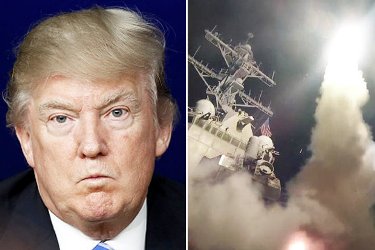
“Presidents often see a quick improvement in their favorability ratings after using military force,” wrote Michael D. Shear, a White House correspondent for The New York Times, in a recent article in the American daily.
Trump drew widespread criticism for trampling on the so-called American values and legacy, both on the campaign trail and following his election.
Soon after assuming office as the 45th president of the United States, he issued an order to bar Muslims from entering the country, claiming that terrorists mostly come from Muslim nations.
Adopting the slogan to “make America great again”, led Trump and his Republican supporters to employ an anti-migrant rhetoric and call for putting restrictions on foreigners entering the US, a nation of immigrants.
Too, his decision to construct a wall on the US border with Mexico and his plan to repeal and replace programs developed and undertaken by the Democratic administration before him, like the Obamacare, were among controversial issues fuelling speculations that the fledgling president is not going to see out his full term.
'We’ve taken five times the amount of bets on him failing to see out his full term than on him doing so,' wrote Ladbrokes, a world leader in online betting and gaming, taking bets on the fate of Trump’s future in the White House.
Now, just around 80 days into his term, Trump has ordered the bombing of Al Shayrat airfield in Homs Province in western Syria, allegedly in response to Bashar Assad government’s use of chemical weapons on Tuesday in the rebel-held region of Idlib.
“Tonight, I ordered a targeted military strike on the air base in Syria from where the chemical attack was launched,” the US president said on Thursday night.
“It is in this vital national security interest of the United States to prevent and deter the spread and use of deadly chemical weapons,” Trump said.
To win more hearts both among the American public and politicians, Trump also tried to play a game of blames by criticizing his predecessor’s political indecisiveness to appropriately address global issues like the crisis in Syria.
What Bashar Assad did was a “consequence of the past administration's weakness and irresolution,” he alleged, referring to former President Barack Obama.
“President Obama said in 2012 that he would establish a 'red line' against the use of chemical weapons and then did nothing,” he added.
But the American president and the businessman fell short of noting that how Washington and its allies in the West decided to turn a blind eye on Saddam’s deployment of chemical weapons in the final years of Iraq’s imposed war against Iran and more surprisingly against the Iraqi Kurds at the town of Halabja in March 1988.
As terrorists are increasingly losing ground in Syria and the country’s Armed Forces tend to have the upper-hand over them liberating Syrian cities and regions one after another, Washington and its regional allies are making every attempt to secure themselves a clout in the region.
In the meantime, by firing 59 Tomahawk cruise missiles from two US warships - the USS Ross and USS Porter - to target an airfield in Syria, a country that remains to be in the frontline of the fight against terrorism, Washington sent a signal for its regional allies and proxy terrorist groups, giving them assurances for continued White House support for them.
2044**2050
www.irna.ir
 solhkhabar | Peace International News Agency Peace International News Agency , Peace News , International Agency News of Peace
solhkhabar | Peace International News Agency Peace International News Agency , Peace News , International Agency News of Peace